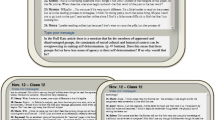Abstract
Ten students in a graduate-level course on Historical and Policy Perspectives in Higher Education held face-to-face and online discussions on five controversial topics: diversity, academic freedom, political tolerance, affirmative action, and gender. Upon completion of each discussion, they assessed their comfort, honesty, concern for others’ feelings, similarity of feelings to others, and willingness to disagree and then compared the face-to-face and online discussions on these measures. Students’ assessments are complex and indicate that some topics did elicit feelings of discomfort, concern for others’ feelings, and willingness to disagree in the face-to-face discussions. However, despite these feelings, the majority of students continued to prefer the face-to-face discussions. Online discussions were valued to a lesser extent, but a consistent minority of students were more comfortable in that setting. The age and race of the student also created differences in responses.
Similar content being viewed by others
References
American Association of University Professors (2006). Academic freedom and tenures. Retrieved May 25, 2006 from http://www.aaup.org/Com-a/index.htm.
Anderson, L. W., & Krathwohl, D. R. (2001). A taxonomy for learning, teaching, and assessing: A revision of Bloom’s taxonomy of educational objectives. New York, NY: Longman.
Chang, M. J., Astin, A. W., & Kim, D. (2004). Cross-racial interaction among undergraduates: Some consequences, causes, and patterns. Research in Higher Education, 45, 529–553.
Clark, R. E. (1994). Media will never influence learning. Educational Technology Research and Development, 42(2), 21–29.
Gladwell, M. (2002). The tipping point. New York, NY: Little, Brown and Company.
Kozma, R. (1994). Will media influence learning? Reframing the debate. Educational Technology Research and Development, 42(2), 7–19.
Laird, T. F. N. (2005). College students’ experiences with diversity and their effects on academic self-confidence, social agency, and disposition toward critical thinking. Research in Higher Education, 46, 365–387.
Mayhew, M. J., Grunwald, H. E., & Dey, E. L. (2005). Curriculum matters: Creating a positive climate for diversity from the student perspective. Research in Higher Education, 46, 389–412.
Meyer, K. A. (2004). Putting the distance learning comparison study into perspective: Its role as personal journey research. The Online Journal of Distance Learning Administration, 7(1). [http://www.westga.edu/%7Edistance/ojdla/spring71/meyer71.html].
Political Gateway. (2006). Ward Churchill’s essay and statement. Retrieved May 25, 2006 from http://www.politicalgateway.com/news/read.html?id=2739.
Russell, T. L. (1999). The no significant difference phenomenon. Raleigh, NC: North Carolina State University.
Smith, P. L., & Dillon, C. (1999). Comparing distance learning and classroom learning: Conceptual considerations. The American Journal of Distance Education, 13(2), 6–23.
Stark, J. S., & Lattuca, L. R. (1997). Shaping the college curriculum: Academic plans in action. Needham Heights, MA: Allyn & Bacon.
Trosset, C. (1998). Obstacles to open discussion and critical thinking: The Grinnell College Study. Change, 30(5), 44–49.
Author information
Authors and Affiliations
Corresponding author
Additional information
Dr. Katrina Meyer is an associate professor of Higher and Adult Education at The University of Memphis. Her Ph.D. is from the University of Washington, and her research interests include online learning and virtual universities.
Appendix: Instrument
Appendix: Instrument
Questions asked after each discussion (answers limited to very = 1, moderately = 2, somewhat = 3, a little = 4, and not at all = 5:
-
1.
How uncomfortable did you feel?
-
2.
How honest were you?
-
3.
How worried were you about hurting others’ feelings?
-
4.
Do you think you feel the same as others in the class?
-
5.
How willing were you to disagree with others?
-
6.
Would you prefer to have this discussion online?
Additional questions asked after the completion of both face-to-face and online discussion (answers limited to face-to-face, online, or no difference):
-
7.
Was the face-to-face or the online discussion more comfortable?
-
8.
Was the face-to-face or the online discussion more honest?
-
9.
Were you more worried about hurting others’ feelings in the face-to-face or online discussion?
-
10.
Did you feel as if you had the same feelings as others in the face-to-face or online discussion?
-
11.
Were you more willing to disagree with others in the face-to-face or online discussion?
-
12.
Would you prefer to have this discussion face-to-face or online?
Open-ended questions asked after both face-to-face and online discussions were completed:
-
13.
Why would you prefer to hold this particular discussion face-to-face or online?
-
14.
What was the most important thing you learned from this discussion AND was it during the face-to-face or online discussion?
Rights and permissions
About this article
Cite this article
Meyer, K.A. When Topics are Controversial: Is it Better to Discuss Them Face-to-Face or Online?. Innov High Educ 31, 175–186 (2006). https://doi.org/10.1007/s10755-006-9019-3
Published:
Issue Date:
DOI: https://doi.org/10.1007/s10755-006-9019-3




